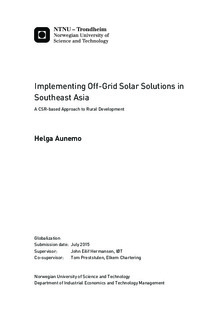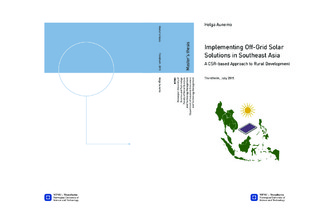| dc.description.abstract | This thesis looks into the challenges facing agents implementing new technology in rural communities in Southeast Asia. The main focus is on solar energy as enabler for development, with a two-level analysis of the REC SolarBox and the LAMTIB Initiaitve. The methodology makes use of a sustainability SWOT framework and a comparison against proposed UN sustainable development goals (SDG). The specific objectives are to identify what extent solar energy solutions can meet the demands of rural communities in Southeast Asia, and how the implications comply with the post-2015 development agenda. The theoretical framework presents the concepts of globalization, sustainable development, CSR and megatrends. The questions are investigated in the context those concepts. The main findings are that there is significant potential for solar energy in rural areas of Southeast Asia, if the electrification comes with targeted modules aimed at development and management on ground . The LAMTIB Initiaitve aligns well with the proposed SDG framework, showing high convergence with eight of the seventeen goals, and medium convergence with five goals. Recommendations are proposed for current and future stakeholders of the LAMTIB initiative and similar projects. | |

